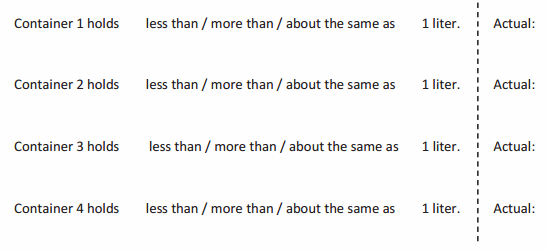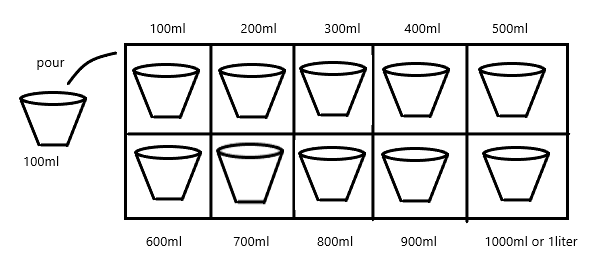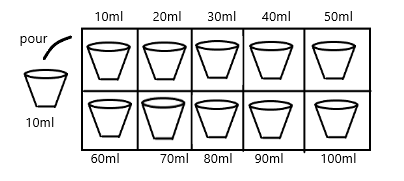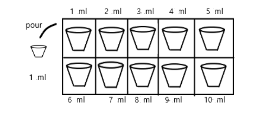Engage NY Eureka Math 3rd Grade Module 2 Lesson 9 Answer Key
Eureka Math Grade 3 Module 2 Lesson 9 Problem Set Answer Key
Part 1
a.
Predict whether each container holds less than, more than, or about the same as 1 liter.

b. After measuring, what surprised you? Why?
Part 2
c. Illustrate and describe the process of decomposing 1 liter of water into 10 smaller units.
Answer:

Explanation:
I decomposed 1liter of water into 10 smaller units by pouring 100 milliliter of water into each cup.Then count each cup by 100ml.I found that 1000ml that is 10 groups of 100ml is equal to 1 liter.
1000ml/10=100ml.
d. Illustrate and describe the process of decomposing Cup K into 10 smaller units.
Answer:

Explanation:
I decomposed 100ml of water into 10 smaller units by pouring 10milliliter of water into each cup.Then count each cup by 10ml.I found that 100ml that is 10 groups of 10ml is equal to 100ml.
100ml/10=10ml
e. Illustrate and describe the process of decomposing Cup L into 10 smaller units.
Answer:

Explanation:
I decomposed 10ml of water into 10 smaller units by pouring 1milliliter of water into each cup.Then count each cup by 1ml.I found that 10ml that is 10 groups of 1ml is equal to 1ml.
10ml/10=1ml
f. What is the same about decomposing 1 liter into milliliters and decomposing 1 kilogram into grams?
Answer:
Decomposing of 1 liter into milliliters and decomposing 1 kilogram into grams will work same.10ml is ten 1ml, 100ml is ten 10ml and 1 liter is ten 100ml.Both kilograms and grams and liters and milliters are same.
g. One liter of water weighs 1 kilogram. How much does 1 milliliter of water weigh? Explain how you know.
Answer:
Since decomposing 1 liter into milliters is same as decomposing 1 kilogram into grams, we know that 1ml weighs same as 1 gram.
Eureka Math Grade 3 Module 2 Lesson 9 Exit Ticket Answer Key
Question 1.
Morgan fills a 1-liter jar with water from the pond. She uses a 100-milliliter cup to scoop water out of the pond and pour it into the jar. How many times will Morgan scoop water from the pond to fill the jar?
Answer:
10 times
Explanation:
Morgan fills a 1-liter jar with water from the pond. She uses a 100-milliliter cup to scoop water out of the pond and pour it into the jar
As we know 1l is ten 100ml
To find the number of times Morgan scoop water from the pond to fill the jar morgan has to pour 10 times.
Question 2.
How many groups of 10 milliliters are in 1 liter? Explain.
There are _____________ groups of 10 milliliters in 1 liter.
Answer:
There are 100 groups of 10 milliliters in 1 liter.
Explanation:
As we know 1l is equal to ten 100ml and 100ml is equal to ten 10ml.Therefore 1l is equal to hundred 10ml.
Therefore, There are 100 groups of 10 milliliters in 1 liter.
Eureka Math Grade 3 Module 2 Lesson 9 Homework Answer Key
Question 1.
Find containers at home that have a capacity of about 1 liter. Use the labels on containers to help you identify them.
a.
| Name of Container |
| Example: Carton of orange juice |
| A water bottle |
| A tin of oil |
| A pack of milk |
| A pack of curd |
b. Sketch the containers. How do their sizes and shapes compare?
Question 2.
The doctor prescribes Mrs. Larson 5 milliliters of medicine each day for 3 days. How many milliliters of medicine will she take altogether?
Answer:
The doctor prescribes Mrs. Larson 5 milliliters of medicine each day for 3 days
To find the number of milliliters medicine will she take altogether multiply 5 by 3
5 x 3=15milliliters
Therefore, 15milliliters medicine will she take altogether.
Question 3.
Mrs. Goldstein pours 3 juice boxes into a bowl to make punch. Each juice box holds 236 milliliters. How much juice does Mrs. Goldstein pour into the bowl?
Answer:
Mrs. Goldstein pours 3 juice boxes into a bowl to make punch. Each juice box holds 236 milliliters.
To find the number of milliliters of juice Mrs. Goldstein pour into the bowl multiply 236 by 3
236 x 3=708
Therefore, 708milliliters of juice Mrs. Goldstein pour into the bowl.
Question 4.
Daniel’s fish tank holds 24 liters of water. He uses a 4-liter bucket to fill the tank. How many buckets of water are needed to fill the tank?
Answer:
Daniel’s fish tank holds 24 liters of water. He uses a 4-liter bucket to fill the tank
To find the number of buckets of water needed to fill the tank divide 24 with 4
24/4=6
Therefore, 6 buckets of water are needed to fill the tank.
Question 5.
Sheila buys 15 liters of paint to paint her house. She pours the paint equally into 3 buckets. How many liters of paint are in each bucket?
Answer:
Sheila buys 15 liters of paint to paint her house.She pours the paint equally into 3 buckets.
To find the number of liters of paint are in each bucket divide 15 with 3
15/3=5
Therefore, 5 liters of paint are in each bucket.